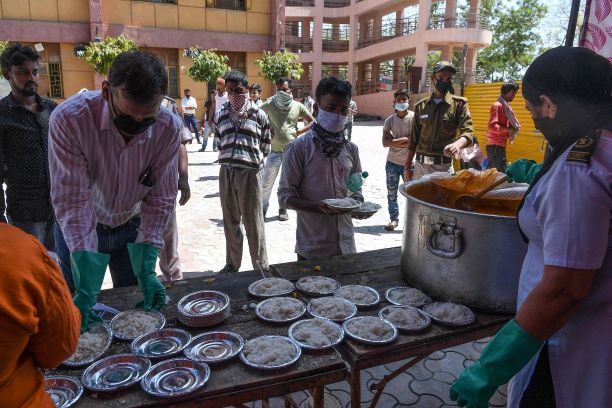
As the government’s inadequacy in ‘Food-Security-Related’ measures and consequences of an unplanned lockdown are being buffered by a handful of organisations, one must ask how does dousing homebound citizens with chemicals and holding the rest back in stadia-turned jails become a crucial concern of biosecurity for the government, more than providing food and nutritional security? Are citizens pests or people?
The question isn’t about a difference between an ideological left and right but is a plain one about the government being humane or inhumane one. Between one that gets away with executional expediency, elides over violence and atrocities during a health crisis and hopes that a cosmeticized apology saves the day, or one that realises that core to any state’s engagement with biosecurity during a health crises, are food-nutrition nets.
As workers migrated out of Delhi NCR in thousands on foot last week, their concern wasn’t the infection as much as they feared going hungry. And many did. If citizens are bodies at risk of being infected by Covid-19 then they are also the same bodies at risk to be pierced by hunger, undernourishment and deficiencies. The link between food, nutrition and immunity is well established. As much as daal-chawal is essential, a nutrition net for basic immunological response is still crucial. It is disconcerting to see how far a state undermines the need for food and nutritional nets to combat basic infections and aggressive ones like Covid-19.
A pandemic is a reminder in its worst shape of class disparities – those who can hoard a variety of food and those dying of hunger. In the fright of essentializing this social concern as a biological one, we’ve unfortunately waited for a harrowing crisis like Covid-19 to re- engage with food-nutritional concerns, where otherwise we are happy to close a discussion on a calorific note, or worse at hunger.
The more common understanding of biosecurity and a government’s role has been about saving crop and farm produce from pests, diseases and disasters. While it begins with farming, the responsibility does not end there. Ensuring that all citizens have access to food is also crucial to biosecurity. Yet the contestations against the implementation of such measures have been about scale, budget and sustainability in India.
As we compare numbers, testing kits, ventilators and masks with other nations, perhaps we should also compare the measures different nations have taken towards food security- from community kitchens, make-shift farms, vertical farms to food banks. A host of these initiatives are sustained and supported by state policies allowing for cooperation between NGOs, community volunteers, food joints and food chains. Food security and health infrastructure are not mutually exclusive during a health crisis and Covid-19 tells us exactly this. Even if someone thought of immunity boosters in community health initiatives, it is pointless without ensuring access to nutritious food.
India has been on its toes with Modi-Manoeuvres making structural alterations overnight and the conversation about medical preparedness and healthcare capacities have held the centre stage among our thinkers and analysts so far. Yet the fight cannot be won solely from the pharmaceutical front. Any effort to fight a health crisis is only half done till we acknowledge that all measures are additional to the most essential requirement- nutritious food.
The continuing ‘Jugaad’ approach is only a populist aegis behind which the government has washed its hands off the most essential parts of citizen biosecurity. It has us convinced that we are ‘capable’ of finding our way through adversities like hunger and deficiencies, irrespective of the government stepping in or not. Unfortunately, this government knows that proposing a weekly symbol of performative solidarity can save itself more ground than initiating long term basic security measures like locally situated food-nets.
Shreeja Banerjee is pursuing her M.Phil in Sociology from JNU, New Delhi.













